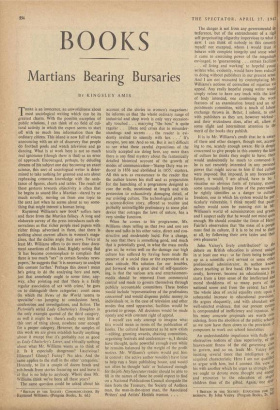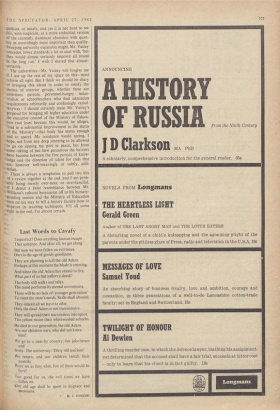BOOKS
Martians Bearing Bursaries
By KINGSLEY AMIS rr HERE is an innocence, an unworldliness about
I most sociological writing which can be its greatest charm. With the possible exception of public relations, I can think of no field of cul- tural activity in which the expert seems to start off with so much less information than the ordinary citizen. This island is now full of voices announcing with an air of discovery that people do football pools and watch television and go dancing. What is at work here is not so much real ignorance (though there is that) as an error of approach. Encouraged, perhaps, by deluding dreams of his subject one day becoming an exact science, this sort of sociological writer is deter- mined to take nothing for granted and sets about rephrasing common knowledge with the assis- tance of figures, charts and tables. The result of these gestures towards objectivity is often that he begins to sound like a Martian—dazed by so much novelty, moving on from one topic to the next just when he seems about to say some- thing that might interest a human being.
Raymond Williams's new book* suffers here and there from the Martian fallacy. A long and elaborate survey of the press introduces such ob- servations as that richer people read papers with richer things advertised in them, that there is nothing about current affairs in women's maga- zines, that the dailies angle their news. Twice at least Mr. Williams offers to do more than docu- ment assertions of this kind. Rightly noting that 'it has become commonplace to complain that there is too much "sex" in certain Sunday news- papers,' he suggests that 'it is necessary to analyse this content further.' Perhaps this doesn't mean he's going to do the analysing here and now, just that somebody ought to some time; any- way, after pointing out that 'there is a fairly regular association of sex with crime,' he goes on to distinguish three categories: court cases (in which the News of the World 'seems to specialise'--no jumping to conclusions here), confessions and investigations, and fiction. The Pictorial's serial Lady Chatterley's Daughter is the only example quoted of the third category, as well it might be: there's really very little of this sort of thing about, nowhere near enough for a proper category. However, the samples of this work we arc given establish hardly anything about it except that it's probably not as good as Lady Chatterley's Lover, and virtually nothing about what Mr. Williams wants us to think of it. Is it especially dangerous? Lascivious? Illiterate? Glossy? Funny? No idea. And the same applies to the stuff in the other 'categories.' Honestly, to list a couple of dozen heads and sub-heads from stories featuring sex and leave it at that is no help to anybody. Where does Mr. Williams think we've been all these years?
The same question could be asked about his
* BRITAIN IN TILE SIXTIES : COMMUNICATIONS. By Raymond Williams. (Penguin Books, 3s. 6d.)
account of the stories in women's magazines: he informs us that 'the whole ordinary range of industrial and shop work is only very occasion- ally touched . . . marrying "the boss" is quite regular . . . [there are] crises due to misunder- standings and secrets . . . the reader is evi- dently invited to identify with her. . .' It's escapist, you see. And so on. But it isn't difficult to see what these careful expositions of the totally accepted are doing here, any more than there is any final mystery about the fantastically detailed historical account of the growth of modes of communication—'Stamp Duty was re- duced in 1836 and abolished in 1855,' etcetera. All this acts as reassurance to the reader that the author knows his stuff and as preparation for the launching of a programme designed to cure the evils, mentioned at length and with pretension to exhaustively damaging detail, of our existing culture. The technological patter in a science-fiction story, offered as routine and probably unintelligible preliminary to some plot- device that outrages the laws of nature, has a very similar function.
When he comes to his programme, Mr. Williams stops telling us that two and one are three and talks in his other voice, direct and con- structive and moderately lucid. For a change, he sees that there is something good, and much that is potentially good, in what the mass media give us; he writes well on the damage our high culture has suffered by having been made the preserve of a social class or the expression of a class attitude. His solution for our troubles, put forward with a great deal of self-question- ing, is that the various arts and entertainment- media should be removed from commercial control and made to govern themselves through publicly accountable committees. These bodies would include 'representatives of the professions concerned' and would dispense public money to individuals or, in the case of television and other modes that need apparatus, facilities would be granted to groups. All decisions would be made openly and with constant right of appeal.
I myself can only attempt to imagine what this would mean in terms of the publication of books. The cultural bureaucrat as he now exists —editing, granting awards, chairing committees, organising festivals and conferences—is, I should have thought, quite powerful enough even while he remains balanced by the weight of the profit motive. Mr. Williams's system would put him in control: the active author wouldn't have time to help run a State publishing house, and would not often be thought 'safe' or 'balanced' enough for the job. Any Spectator reader should be able to fill in the names of those he could expect to find on a National Publications Council alongside the men from the Treasury, the Society of Authors man, the man-in-the-street man, the Associated Writers' and Artists' Hostels woman. . . .
The danger is not from any governmental in• terference, but of the entrenchment of a rigid self-perpetuating oligarchy impervious to what it new. 1 can think of nobody in this countrY, myself not excepted, whom 1 would trust to behave with complete integrity and sense whet it came to exercising power of the magnitude envisaged, to 'guaranteeing . . . certain facilities . . . of living and working' to hopeful young writers who, evidently, would have been reduced to doing without publishers in our present sense. And I am not reassured by contemplating Mr. Williams's notions of correction of injustice vie appeal. Any really hopeful young writer would simply refuse to have any truck with the kind of body intended, one combining the worst features of an examination board and an ar pointments committee, with a touch of labour exchange thrown in. Better, I submit, to slid( with publishers as they are, however wicked-- and their wickedness does, after all, allow Of some slight and intermittent attention to the merit of the books they publish.
It is to Mr. Williams's credit that he is aware of these and other dangers, though not, accord• ing to me, acutely enough aware. He is deeplY concerned to give people in this country the kind of culture he thinks they ought to have; there would undoubtedly be much to commend iti he is not remotely interested in any personal power that might accrue to him if that culture were imposed. But imposed, in any foreseeable future, it would, I am afraid, have to be. visualise no obvious form of tyranny, merely some unusually benign form of the paternalist he rightly identifies as a danger to cultural freedom, one to which his system would be par' ticularly vulnerable. I think myself that paler" nalism would soon be running riot in Mt.' Williams's world of administrators and grants, and I suspect sadly that he would not mind quite enough. He should consider the force of Henri Fairlie's observation that 'the mass of a people must find its culture, if it is to be real to the at all, by following their own tastes and their own pleasures ' John Vaizey's lively contribution)' to the debate on British education is almost unique in at least one way: so far from being brought up as a scientific civil servant or some other professional administrator, its author knows about teaching at first hand. (He has more re- cently, however, become an educationist.) 2,c starts from a keen sense of the intellectual and moral shoddiness of so many parts of the national scene and from the central fact that 'the whole idea of social equality rests upon a, substantial increase in educational provision. He argues eloquently, and with abundant and well-selected evidence, that our present syste".: is compounded of inefficiency and injustice. A" his many concrete proposals are worth con' sidering, from the abolition of the public schools as we now have them down to the provision 01 computers to work out school timetables. An understandable impatience with fluffy and obstructive notions of class superiority, of the heaven-sent fitness of the old governing Cli° to govern, and so on, leads Mr. Vaizey into insisting several times that intelligence is "I1 acquired characteristic. Here I am not qualifef to argue with him, but I connect this view hiS with another which he urges as strongly. that we ought to devote more thought and enel and resources to the education of stupid children than of the gifted. Again, one sYnl.
t BRITAIN IN THE SIXTIES: EDUCATION FOR MORROW. By John Vaizey. (Penguin Books, 2s. 6°'' Pathises, or nearly; and yet it is not hard to see this, with suspicion, as a more embattled version of the currently dominant obsession with quan- tity as overridingly more important than quality. Sweeping university expansion might, Mr. Vaizey concedes, lower standards a lot to start with, 'but they• would •almost certainly improve all round in the long run.' I wish I shared that almost- certainty.
The universities—Mr. Vaizey will forgive me if I use up the rest of my space on this—need reform all right. But I think we should be chary of bringing this about in order to satisfy the desires of exterior groups, whether these are ambitious parents, personnel-hungry indus- trialists or schoolteachers who find admission requirements arbitrarily and confusingly varied. Anyway : I should certainly resist Mr. Vaizey's proposal for bringing all higher education under the executive control of the Ministry of Educa- tion (not least because this would, he alleges, `lead to a substantial improvement in the status of the Ministry'—that body has status enough and to spare). My resistance would spring, I hope, not from any deep yearning to be allowed to go on sipping my port in peace, but from
(''some inkling of just how precarious the barriers • have become between the free pursuit of know- : Wedge • and the direction of talent for ends that liPare, however well-meaningly or subtly, utili-
tarian.
There is always a temptation to pull two bits ' of a review together at the end, and I am prob- ``''131Y being merely over-neat, or over-fanciful, detect a faint resemblance between Mr. Williams's cultural bureaucrat off to his bursary- ' granting session and the Ministry of Education ' 11. tan on his way to tell -a history faculty how to '"Improve its teaching techniques. It'll all come 'right in .the end, I'm almost certain.
• 10















































 Previous page
Previous page